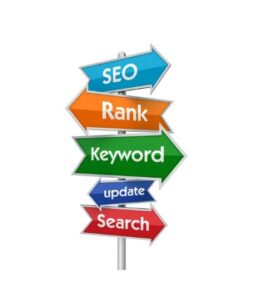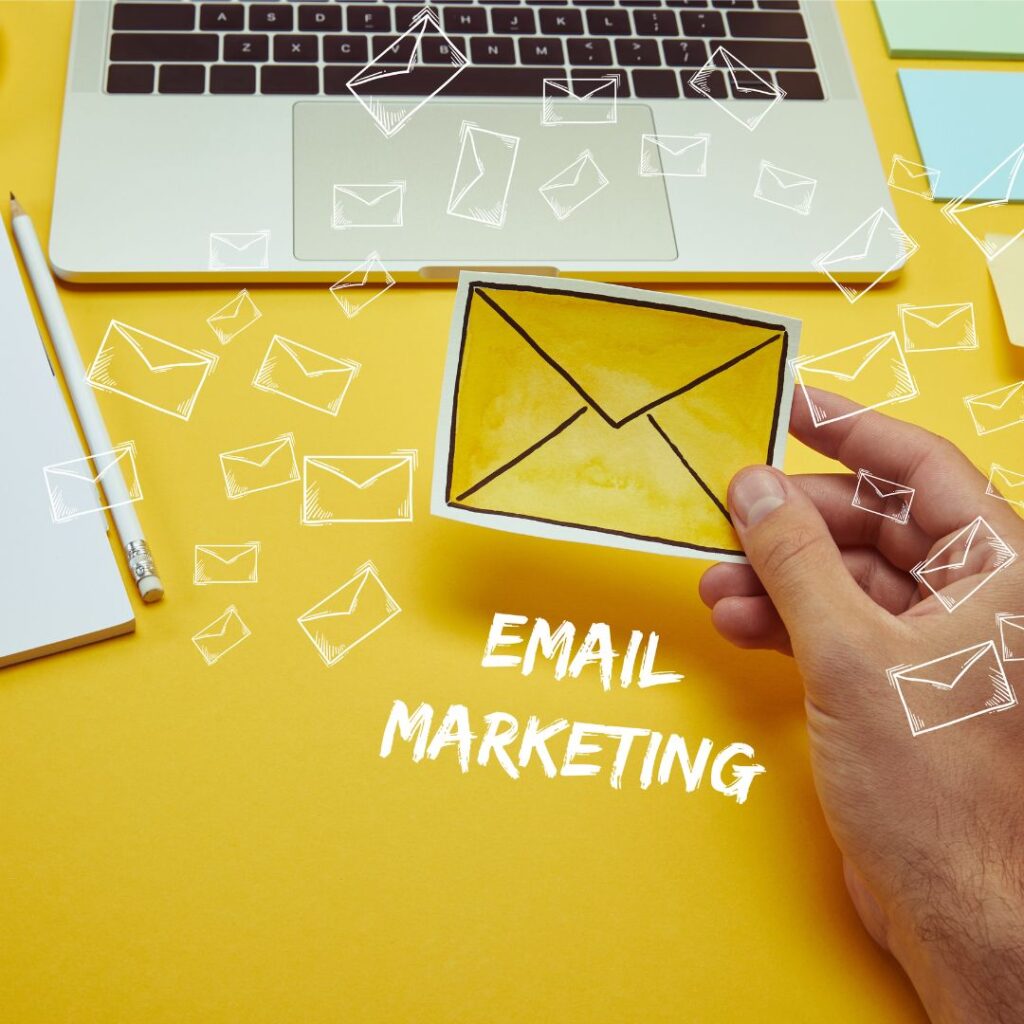In today’s hyper-connected world, digital marketing isn’t just an option—it’s essential for businesses. Whether you’re a startup entrepreneur or an established business owner, mastering the digital landscape can be the difference between thriving and merely surviving.
Marketing digitally is an essential component of modern business strategy, encompassing a range of practices designed to reach and engage customers online. This guide to Digital Marketing will walk you through the key elements of marketing for small business, providing practical steps and insights to help you succeed.
Key Takeaways
- Understand Online Marketing: Learn the fundamentals and significance of this type of marketing for business growth.
- SEO: Discover strategies for optimizing your website to rank higher on search engines.
- Content Marketing: Understand how to create and distribute valuable content to attract and engage your target audience.
- Email Marketing: Learn the essentials of building and nurturing an email list.
- PPC Advertising: Explore how to use pay-per-click advertising to drive targeted traffic.
- Social Media Marketing (SMM): Find out how to leverage social media platforms to build your brand and connect with customers.
- Metrics for Success: Identify key performance indicators to measure the effectiveness of your marketing efforts.
Why Online Marketing Matters for Your Business
In today’s fast-paced, internet-driven world, businesses have an unprecedented opportunity to connect with diverse and engaged audiences. Marketing online isn’t just about reaching these audiences—it’s about forging meaningful connections that drive growth.
Consider this: When was the last time you saw someone without a smartphone? Mobile devices and the internet have become inseparable parts of our daily lives. Your potential customers are already online, searching for products, reading reviews, and engaging with brands on social media. By embracing internet marketing, you’re meeting them where they spend a significant portion of their time and attention.
5 Game-Changing Benefits of Online Marketing for Your Business
So, what can online advertising do for your business? Here are some compelling benefits and a few reasons why it’s a game-changer:
- Increased Visibility in Your Community: The internet opens doors to billions of users. With web-based marketing, you can significantly boost your online presence, making it easier for customers to discover your business. Whether you’re aiming for a broader audience or focusing on your immediate community, digital strategies puts you on the map.
- Precision-Targeted Reach: Unlike traditional marketing methods, digital strategies allow you to target specific demographics, interests, and behaviors. This precision ensures your message reaches the right audience at the right time, maximizing the impact of your marketing efforts.
- Cost-Effective Strategies: Many online marketing tactics, such as search engine optimization (SEO), offer impressive returns on investment without draining your budget. Start small and scale your efforts as your business grows, making it ideal for businesses of all sizes.
- Data-Driven Decision Making: One of the most powerful aspects of internet marketing is its measurability. With the right tools, you can track the performance of your campaigns in real-time. These analytics provide invaluable insights, helping you make informed decisions and continuously improve your marketing strategy.
- Enhanced Customer Relationships: Digital platforms like social media and email marketing open direct lines of communication with your customers. Engage in conversations, respond to feedback, and build a community around your brand. In the digital age, fostering customer loyalty and trust has never been more achievable.
Understanding the Basics of Digital Marketing
Digital marketing is the cornerstone of modern business growth. But what exactly does it entail, and how can you harness its power for your business? Let’s break it down into digestible pieces.
What is Digital Marketing?
At its core, digital marketing is about promoting your business through online channels. Think of it as traditional marketing with a powerful digital twist. Instead of billboards and flyers, you’re using websites, social media platforms, search engines, and email to reach your target audience.
The goal? To connect with potential customers where they spend a significant portion of their time – online. Whether they’re browsing social media, searching for services, or checking their email, your marketing efforts ensure your business is visible and engaging.
Getting Started with Digital Marketing
Beginning your digital marketing journey doesn’t have to be overwhelming. Here’s a roadmap to get you started:
- Set Clear Goals: What do you want to achieve? More website traffic? Increased sales? Enhanced brand awareness? Define your objectives to guide your strategy and measure success.
- Identify Your Audience: Who are you trying to reach? Understanding your target audience helps you tailor your message and choose the right digital channels.
- Develop a Strategy: Create a plan outlining which digital channels you’ll use, what type of content you’ll create, and how you’ll allocate your budget.
- Start Small and Scale: You don’t need to tackle every digital platform at once. Begin with one or two channels and expand as you gain confidence and see results.
- Embrace SEO: Ensure your business appears in search results by optimizing your website and utilizing tools like Google My Business.
- Leverage Social Media: Create engaging content and interact with your audience on platforms where your customers are most active.
- Monitor and Adjust: Keep track of your results and be prepared to make adjustments. Marketing digitally is an ongoing process of learning and optimization.
By following these steps, you’ll build a strong foundation for your marketing efforts, setting your business up for online success.
Essential Components and Strategies of Digital Marketing for Businesses
In today’s digital landscape, businesses need a comprehensive approach to online marketing. Understanding the core components of marketing digitally and how to strategically implement them is crucial for success. Let’s explore these key elements and the strategies to leverage them effectively:
1. Search Engine Optimization (SEO)
What it is: Optimizing your website to rank higher in search engine results.
Why it matters: Increases visibility, drives organic traffic, and builds credibility.
Key Strategies:
- Claim and optimize your Google My Business listing for local search visibility.
- Incorporate location-based keywords naturally in your content (e.g., “artisanal coffee shop in downtown”).
- Focus on local SEO tactics to appear in “near me” searches and local business listings if applicable.
- Encourage and respond to customer reviews to boost your search presence.
2. Content Marketing
What it is: Creating and sharing valuable, relevant content to attract and engage your target audience.
Why it matters: Establishes your expertise, builds trust, and improves search engine rankings.
Key Strategies:
- Share blog posts with tips, news, and stories relevant to your industry and community.
- Create engaging videos showcasing your products, services, or behind-the-scenes glimpses.
- Write about events you’re participating in to connect with the community.
- Address customer concerns and interests in your content to resonate with your audience.
3. Email Marketing
What it is: Sending targeted messages to current and potential customers via email.
Why it matters: Nurtures leads, drives sales, and maintains customer relationships.
Key Strategies:
- Build your email list by offering incentives for sign-ups (e.g., discounts or freebies).
- Segment your list to send personalized offers to different customer groups.
- Provide consistent, valuable updates about new products, services, and special offers.
- Personalize content to increase open and conversion rates.
4. Pay-Per-Click (PPC) Advertising
What it is: Running paid ads on search engines or social media platforms.
Why it matters: Provides immediate visibility and allows for precise audience targeting.
Key Strategies:
- Create targeted Google Ads that appear for specific keywords related to your business.
- Use geo-targeting in your campaigns to reach customers in specific neighborhoods.
- Leverage social media ads on platforms like Facebook or Instagram for customer targeting.
- Start with a small budget, monitor performance, and adjust based on results.
What it is: Using social platforms to connect with your audience and promote your brand.
Why it matters: Builds community, increases brand awareness, and provides direct customer interaction.
Key Strategies:
- Choose platforms where your target audience is most active.
- Maintain consistent branding across all your social media profiles.
- Engage actively by responding promptly to comments, messages, and mentions.
- Use location-based targeting for your posts and ads to reach customers.
- Share content about events and community involvement to strength connections.
6. Analytics and Data Analysis
What it is: Using tools to track and analyze the performance of your marketing efforts.
Why it matters: Enables data-driven decision making and helps optimize your strategies.
Key Strategies:
- Monitor search trends and customer behavior to tailor your offerings and marketing messages.
- Use tools like Google Analytics to track website performance and user behavior.
- Analyze the performance of your email campaigns, social media posts, and PPC ads.
- Use insights gained to continuously refine and improve your marketing strategies.
By implementing these core components and strategies, you’ll create a robust digital presence that attracts and retains customers. Remember, the key is to start with what makes sense for your business and scale your efforts as you grow. Each element works in synergy with the others, creating a comprehensive marketing approach that can significantly boost your online presence and drive business growth.
The Critical Role of SEO in Your Marketing Strategy
Search Engine Optimization (SEO) is the cornerstone of a successful marketing strategy. Let’s explore why SEO is crucial and how you can leverage it to boost your online visibility.
What is SEO?
SEO is the practice of optimizing your website and online content to rank higher in search engine results pages (SERPs). It’s like ensuring your business is on the main street of the digital world, where potential customers can easily find you.
Why is SEO Essential for Your Business?
-

Increased Visibility: Higher rankings mean more eyes on your business. When you appear at the top of search results, you’re more likely to attract clicks and visits.
- Targeted Traffic: SEO helps you attract users who are actively searching for your products or services. This targeted approach leads to higher conversion rates.
- Cost-Effectiveness: Unlike paid advertising, organic search traffic doesn’t cost you per click. Once you’ve established good rankings, you can enjoy a steady stream of visitors without ongoing ad spend.
- Credibility and Trust: Websites that rank high are generally perceived as more trustworthy. Users tend to believe that if Google ranks you highly, you must be a credible source.
- Better User Experience: Many SEO best practices also improve your website’s user experience, leading to higher engagement and conversion rates.
Key Elements of Effective SEO
To harness the power of SEO for your business, focus on these critical elements:
- Keyword Research: Identify the terms your potential customers are using to find businesses like yours. Use tools like Google Keyword Planner or SEMrush to discover relevant keywords.
- On-Page SEO: Optimize your website’s content, structure, and HTML elements (like title tags and meta descriptions) to make it more search engine friendly.
- Local SEO: For brick-and-mortar businesses, local SEO is crucial. Ensure your Name, Address, and Phone number (NAP) are consistent across all online platforms.
- Quality Content: Create valuable, relevant content that addresses your audience’s needs and questions. This not only helps with SEO but also establishes your expertise.
- Link Building: Earn high-quality backlinks from reputable websites. This could include business directories, chamber of commerce sites, or industry-specific platforms.
- Technical SEO: Ensure your website is fast, mobile-friendly, and secure. These technical factors play a significant role in search rankings.
- User Experience: Design your website with users in mind. A positive user experience leads to longer visit durations and lower bounce rates, which are positive signals to search engines.
Measuring SEO Success
To gauge the effectiveness of your SEO efforts, keep an eye on these key metrics:
- Organic search traffic
- Keyword rankings
- Click-through rates (CTR) from search results
- Conversion rates from organic traffic
- Search visibility
Remember, SEO is not a one-time effort but an ongoing process. Search engines constantly update their algorithms, and your competitors are also working to improve their rankings. Stay informed about SEO best practices and be prepared to adapt your strategy as needed.
By prioritizing SEO in your marketing strategy, you’re setting a strong foundation for long-term online success. Whether you’re a small local shop or a growing regional business, effective SEO can help you reach more customers and achieve your business goals.
The Power of Content Marketing in Your Digital Strategy
Content Marketing is a vital component of a successful online marketing strategy, especially for businesses looking to establish authority and connect with their community. Let’s explore why content marketing is crucial and how you can leverage it to boost your online presence and customer engagement.
What is Content Marketing?
Content Marketing is the practice of creating and distributing valuable, relevant, and consistent content to attract and retain a clearly defined audience. It’s like being the go-to resource in your community, providing information and solutions that your customers are actively seeking.
Why is Content Marketing Essential for Your Business?
- Builds Trust and Credibility: By consistently providing valuable information, you position your business as an expert in your field, fostering trust with potential customers.
- Improves SEO: Quality content helps your website rank higher in search results, increasing your visibility to potential customers.
- Drives Engagement: Compelling content encourages interaction with your brand, keeping your audience engaged and coming back for more.
- Supports Other Marketing Channels: Content fuels your social media, email marketing, and SEO efforts, creating a cohesive marketing strategy.
- Cost-Effective: Compared to traditional advertising, content marketing can be more cost-effective in the long run, providing lasting value and continuous returns.
Key Elements of Effective Content Marketing
To harness the power of content marketing for your business, focus on these critical elements:
- Audience Research: Understand your audience’s needs, questions, and interests. Use tools like surveys or social media insights to gather this information.
- Content Strategy: Develop a plan that outlines what types of content you’ll create, who it’s for, and how it aligns with your business goals.
- Diverse Content Types: Utilize various formats such as blog posts, videos, infographics, and podcasts to cater to different preferences.
- Consistency: Maintain a regular publishing schedule to keep your audience engaged and coming back for more.
- Quality Over Quantity: Focus on creating high-quality, valuable content rather than churning out large volumes of mediocre material.
- SEO Integration: Optimize your content for search engines by incorporating relevant keywords and following SEO best practices.
Measuring Content Marketing Success
To gauge the effectiveness of your content marketing efforts, keep an eye on these key metrics:
- Website traffic from content
- Time spent on page
- Social shares and engagement
- Lead generation from content
- Conversion rates
- Brand awareness and sentiment
Remember, content marketing is a long-term strategy. It takes time to build an audience and see significant results, but the long-term benefits for your business can be substantial.
By prioritizing content marketing in your digital strategy, you’re creating a valuable resource for your community and potential customers. Whether you’re a small local shop or a growing national business, effective content marketing can help you connect with more customers, establish your brand, and achieve your business goals.
Harnessing the Power of Email Marketing
Email Marketing remains one of the most effective marketing tools, especially for businesses looking to build lasting relationships with their customers. Let’s explore why email marketing is crucial and how you can leverage it to boost customer engagement and drive sales.
What is Email Marketing?
Email Marketing involves sending targeted messages to current and potential customers via email. It’s like having a direct line to your customers’ inboxes, allowing you to share updates, offers, and valuable content tailored to their interests.
Why is Email Marketing Essential for Your Business?
- Direct Communication: Email provides a direct channel to communicate with your audience, unaffected by algorithm changes that can impact social media reach.
- High ROI: Email marketing consistently delivers one of the highest returns on investment of any marketing channel.
- Personalization: Emails can be highly personalized, increasing relevance and engagement with your audience.
- Builds Customer Loyalty: Regular, valuable communication helps keep your brand top-of-mind and fosters customer loyalty.
- Drives Traffic and Sales: Effective email campaigns can drive traffic to your website and directly influence sales.
Key Elements of Effective Email Marketing

To harness the power of email marketing for your business, focus on these critical elements:
- Build a Quality List: Focus on growing an email list of engaged subscribers who have opted in to receive your communications.
- Segmentation: Divide your list based on customer preferences, behaviors, or demographics to send more targeted, relevant emails.
- Compelling Subject Lines: Craft subject lines that entice recipients to open your emails.
- Valuable Content: Provide content that your subscribers find useful, whether it’s exclusive offers, or helpful tips.
- Mobile Optimization: Ensure your emails look great and function well on mobile devices.
- Clear Call-to-Action (CTA): Include a clear, compelling CTA in each email to guide subscribers on what to do next.
- Automation: Use email automation for welcome series, abandoned cart reminders, and other triggered emails.
Measuring Email Marketing Success
To gauge the effectiveness of your email marketing efforts, keep an eye on these key metrics:
- Open rates
- Click-through rates
- Conversion rates
- List growth rate
- Unsubscribe rate
- Overall ROI
Remember, successful email marketing is about providing value to your subscribers, not just promoting your business. By focusing on your audience’s needs and preferences, you can create email campaigns that resonate with your community and drive business growth.
Maximizing Results with Pay-Per-Click (PPC) Advertising
Pay-Per-Click (PPC) advertising is a powerful tool for businesses looking to gain immediate visibility and drive targeted traffic. Let’s explore why PPC is crucial and how you can leverage it to boost your online presence and attract more customers.
What is Pay-Per-Click (PPC) Advertising?
PPC is a model of internet marketing where advertisers pay a fee each time their ad is clicked. It’s like buying visits to your site rather than earning those visits organically. Google Ads and Bing Ads are popular platforms for PPC advertising.
Why is PPC Essential for Your Business?
- Immediate Results: Unlike SEO, which takes time, PPC can drive immediate traffic to your website.
- Highly Targeted: You can target your ads based on location, demographics, interests, and even specific keywords.
- Budget Control: You have complete control over how much you spend, with the ability to set daily or monthly budgets.
- Measurable ROI: PPC provides detailed metrics, making it easy to measure your return on investment.
- Brand Awareness: Even if users don’t click your ad, seeing it can increase brand recognition.
Key Elements of Effective PPC Advertising
To harness the power of PPC for your company, focus on these critical elements:
- Keyword Research: Identify the right keywords that your potential customers are using to find businesses like yours.
- Ad Copy: Create compelling ad copy that speaks directly to your audience and includes a clear call-to-action.
- Landing Pages: Ensure your ads lead to relevant, optimized landing pages that match the user’s intent.
- Geo-Targeting: Use location targeting to ensure your ads are shown to users in your service area.
- Ad Extensions: Utilize ad extensions to provide additional information like your phone number, location, or customer reviews.
- Negative Keywords: Use negative keywords to prevent your ads from showing for irrelevant searches.
- Bid Strategy: Develop a bidding strategy that aligns with your goals and budget.
Measuring PPC Success
To gauge the effectiveness of your PPC efforts, keep an eye on these key metrics:
- Click-Through Rate (CTR)
- Quality Score
- Conversion Rate
- Cost Per Click (CPC)
- Cost Per Acquisition (CPA)
- Return on Ad Spend (ROAS)
Remember, successful PPC campaigns require ongoing management and optimization. Regularly review your campaigns, test different ad variations, and adjust your strategy based on performance data.
By leveraging PPC advertising effectively, businesses can compete with larger competitors, drive targeted traffic, and achieve their marketing goals more quickly. Whether you’re looking to increase foot traffic to your store or generate leads for your service business, PPC can be a valuable addition to your marketing toolkit.
Leveraging Social Media Marketing (SMM) Business Success

SMM has become an indispensable tool for businesses looking to connect with their community, build brand awareness, and drive customer engagement. Let’s explore why social media is crucial and how you can harness its power to boost your business presence.
What is Social Media Marketing?
Social media marketing involves using social media platforms to connect with your audience, build your brand, increase sales, and drive website traffic. It’s like having a digital storefront where you can interact with your customers, share your story, and showcase your products or services in real-time.
Why is Social Media Essential for Your Business?
- Community Building: Social media allows you to create and nurture a community around your brand, fostering customer loyalty.
- Increased Brand Awareness: Regular posting and engagement can significantly boost your brand’s visibility.
- Direct Customer Interaction: Social platforms provide immediate, two-way communication with your customers, allowing for quick responses and personalized interactions.
- Cost-Effective: Compared to traditional marketing, social media can be a more affordable way to reach a large audience.
- Targeted Advertising: Social media platforms offer sophisticated targeting options, allowing you to reach specific .demographics.
Key Elements of Effective Social Media
To harness the power of social media for your company, focus on these critical elements:
- Platform Selection: Choose platforms where your target audience is most active. For businesses, Facebook, Instagram, and Twitter are often effective.
- Consistent Branding: Maintain a consistent brand voice and visual identity across all your social media profiles.
- Engaging Content: Create a mix of informative, entertaining, and promotional content that resonates with your audience.
- User-Generated Content: Encourage customers to share their experiences with your business and showcase this content on your profiles.
- Influencer Partnerships: Collaborate with influencers or micro-influencers to expand your reach.
- Social Listening: Monitor mentions of your brand and relevant topics to stay engaged with your community.
Measuring Social Media Success
To gauge the effectiveness of your social media efforts, keep an eye on these key metrics:
- Follower growth rate
- Engagement rate (likes, comments, shares)
- Reach and impressions
- Click-through rate to your website
- Conversion rate from social media traffic
- Brand sentiment
Platform-Specific Strategies
- Use Facebook Groups to build a community around your brand or industry.
- Leverage Facebook Live to host Q&A sessions or showcase behind-the-scenes content.
- Utilize Facebook Events to promote niche happenings or in-store promotions.
- Use Instagram Stories and Reels to share quick, engaging content about your products or services.
- Leverage hashtags to increase visibility in your community.
- Showcase user-generated content to build trust and encourage more customers to share their experiences.
- Engage in conversations and use relevant hashtags.
- Share timely updates about your business or industry.
- Use Twitter polls to gather customer feedback and increase engagement.
- Share industry insights and company news to establish thought leadership.
- Engage with other businesses and professionals to build your network.
- Use LinkedIn’s publishing platform to share longer-form content relevant to your industry.
Remember, social media is about building relationships and providing value to your audience. It’s not just about promoting your products or services. By focusing on creating meaningful interactions and valuable content, you can build a loyal following that will support your business.
Consistency is key in social media. Develop a content calendar to ensure regular posting, but also be flexible enough to engage in real-time conversations and trending topics relevant to your community.
By leveraging social media effectively, businesses can significantly enhance their online presence, connect more deeply with their community, and drive both online and offline customer engagement. Whether you’re a small shop, a local restaurant, or a service-based business, social media can be a powerful tool in your marketing arsenal.
Case Study: How Brand Lift 360 Transformed a Local Cafe’s Digital Presence
In the heart of Roseville, a charming family-owned cafe was struggling to stand out in a sea of competitors. With foot traffic dwindling and online presence practically non-existent, the owners knew they needed a change. They hired Brand Lift 360, a marketing agency specializing in revitalizing local businesses through data-driven marketing practices.
The Challenge: A Cafe Lost in the Digital Noise
Imagine a cozy cafe with the best coffee in town, but empty tables and a quiet cash register. This was the reality for our Roseville cafe. Despite their delicious offerings’, they faced several challenges:
- Minimal online visibility
- A dated, uninspiring website
- Lack of social media engagement
- Fierce local competition
The cafe owners knew they needed help, but weren’t sure where to start. That’s when they reached out to Brand Lift 360.
The Solution: Brand Lift 360’s Holistic Approach
Brand Lift 360 began with a comprehensive digital audit, examining every aspect of the cafe’s online presence. Their team of experts developed a multi-faceted strategy tailored to the cafe’s unique needs and local market.

1. Website Overhaul: Creating a Digital Storefront
The agency started by giving the cafe’s website a complete makeover:
- Implemented a sleek, modern design that reflected the cafe’s warm atmosphere
- Ensured mobile responsiveness for on-the-go customers
- Optimized loading speeds to keep potential customers engaged
- Added high-quality images showcasing the cafe’s mouthwatering offerings
- Created compelling, SEO-friendly content that told the cafe’s story
2. SEO Magic: Climbing the Local Search Rankings
To ensure the cafe appeared in local searches, Brand Lift 360:
- Conducted thorough keyword research, identifying terms like “best coffee shop in Roseville” and “Roseville cafe breakfast”
- Optimized website content, metadata, and blog posts with these local keywords
- Created a Google My Business profile and optimized it for local searches
3. Social Media Strategy: Building Community Engagement
Brand Lift 360 knew that social media could be a game-changer for the cafe. They:
- Developed a content calendar filled with engaging posts
- Shared daily specials and promotions to drive foot traffic
- Posted behind-the-scenes content, giving followers a peek into cafe life
- Showcased customer testimonials and reviews to build trust
- Created interactive content like polls and contests to boost engagement
4. Measuring Success: Data-Driven Decisions
Throughout the campaign, Brand Lift 360 kept a close eye on key metrics:
- Website traffic and user behavior
- Search engine rankings for targeted keywords
- Social media engagement rates
- Customer feedback and online reviews
From Struggling to Thriving
The impact of Brand Lift 360’s strategy was nothing short of remarkable. Within just six months:
- Foot traffic increased by 50%
- Overall sales jumped by 30%
- Social media engagement skyrocketed, with followers actively interacting with the cafe’s posts
- The cafe’s website climbed to the first page of local search results for key terms
But the numbers only tell part of the story. The cafe had transformed from a struggling business to a bustling community hub. Regular customers were bringing in friends, and new faces were becoming regulars. The owners reported a renewed sense of excitement and purpose in their business.
Online Marketing Can Transform Local Businesses
This case study proves that with the right strategy, local businesses can thrive in today’s competitive landscape. Whether you’re running a cozy cafe, a boutique shop, or any other local business in Roseville or beyond, the power of marketing digitally is undeniable.
By partnering with experts like Brand Lift 360, who understand the unique challenges and opportunities of local markets, you can:
- Boost your online visibility
- Engage with your community more effectively
- Drive real, measurable results for your business
In an increasingly digital world, having a strong online presence isn’t just an option—it’s essential for success. And as this Roseville cafe discovered, it can be the key to transforming your business from struggling to thriving.
Launching Your Marketing Strategy
Congratulations! You’ve gained valuable insights into SEO, content marketing, email strategies, PPC advertising, and social media. Now comes the exciting part – putting your knowledge into action. Let’s chart your course for marketing success.
Reflect and Prioritize
Before diving in, take a moment to reflect on what you’ve learned:
- Which strategies resonate most with your business needs?
- What areas of digital marketing excite you the most?
- Where do you see the biggest opportunities for your business?
Identifying your priorities will help you focus your initial efforts where they’ll have the most impact. Remember, you don’t need to tackle everything at once. Start with what aligns best with your goals and gradually expand your efforts.
Your Comprehensive Digital Marketing Launch Checklist
Use this expanded checklist to guide your marketing implementation. Remember, you don’t need to complete every item immediately. Focus on your priorities and gradually expand your efforts.
1. Planning and Strategy
Conduct a SWOT analysis of your current digital presence
Identify your top 3-5 marketing priorities
Set SMART goals for each priority (Specific, Measurable, Achievable, Relevant, Time-bound)
Define your target audience(s) (demographics, interests, behaviors, pain points)
Create buyer personas for your primary audience segments
Determine your overall marketing budget
Allocate budget across different marketing channels
Develop a high-level content strategy aligned with your goals
2. Website Optimization
Ensure your website is mobile-friendly (responsive design)
Optimize website loading speed (compress images, minimize code, leverage browser caching)
Implement SSL certificate for secure browsing
Create or update your ‘About Us’, ‘Services’, and ‘Contact’ pages
Set up a blog or news section on your website
Implement basic on-page SEO (title tags, meta descriptions, header tags)
Optimize your site structure and internal linking
Set up conversion tracking (e.g., contact form submissions, newsletter sign-ups)
Ensure your website is accessible (alt text for images, proper heading structure)
3. Search Engine Optimization (SEO)
Conduct keyword research for your industry and target audience
Optimize your Google My Business listing (if applicable)
Ensure NAP (Name, Address, Phone) consistency across all online platforms
Create a strategy for earning quality backlinks
Implement schema markup for rich snippets in search results
Optimize your website for voice search queries
Create or update your XML sitemap
Submit your sitemap to Google Search Console
Set up Google Search Console and Bing Webmaster Tools
Encourage and respond to customer reviews on various platforms
4. Content Marketing
Develop a content marketing mission statement
Create a content calendar for the next 3-6 months
Plan 10-15 blog post topics relevant to your audience
Identify 3-5 cornerstone content pieces to create
Write and publish your first blog post
Create a lead magnet (e.g., ebook, whitepaper, checklist) for email list building
Develop a content distribution strategy
Set up social sharing buttons on your blog posts
Plan for repurposing content across different formats (video, infographics, podcasts)
5. Email Marketing
Choose an email marketing platform (e.g., Mailchimp, Constant Contact, SendinBlue)
Create a compelling sign-up form for your email list
Develop a lead magnet to encourage email sign-ups
Set up an automated welcome email series for new subscribers
Plan your first email newsletter
Segment your email list based on subscriber behavior or preferences
Create email templates for different types of communications
Set up tracking for email opens, clicks, and conversions
Develop a strategy for growing your email list
6. Social Media Marketing
Identify the top 2-3 social media platforms for your business
Create or optimize your profiles on these platforms
Develop a social media content strategy
Plan a month’s worth of social media posts
Set up a social media content calendar
Create branded visual templates for social media posts
Implement a social listening strategy to monitor brand mentions
Engage with your followers by responding to comments and messages
Set up social media advertising campaigns (if budget allows)
Integrate social media sharing buttons on your website
7. Pay-Per-Click (PPC) Advertising
Set up a Google Ads account
Conduct keyword research for PPC campaigns
Create your first search ad campaign
Set up conversion tracking in Google Ads
Create compelling ad copy and call-to-actions
Design effective landing pages for your ads
Set up remarketing campaigns
Explore display advertising options
Consider advertising on industry-specific platforms
8. Analytics and Monitoring
Set up Google Analytics on your website
Set up goal tracking in Google Analytics
Connect Google Search Console to your Google Analytics
Identify the key metrics you’ll track based on your goals
Set up custom dashboards in Google Analytics
Implement UTM parameters for campaign tracking
Set up automated reports for key metrics
Schedule time each week to review your performance
Develop a process for acting on data insights
9. Continuous Learning and Optimization
Subscribe to 2-3 reputable digital marketing blogs or podcasts
Join a business or marketing group on social media
Schedule time each month for learning and skill development
Plan to attend a digital marketing webinar or conference
Set up A/B tests for key website pages or email campaigns
Develop a process for regularly updating and improving your website content
Create a system for collecting and acting on customer feedback
Stay informed about algorithm updates and industry changes
Remember, marketing is an ongoing process. Use this checklist as a starting point and revisit it regularly as you grow your online presence. Celebrate each item you check off – it’s a step towards digital marketing success for your business!
Leverage the Right Tools
As you work through your checklist, equip yourself with tools that can streamline your efforts:
- For social media management: Airtable with Brand Lift 360 automation software, Buffer, Hootsuite, or Metricool
- For SEO: Google Search Console, Ahrefs, or SEMrush
- For email marketing: Mailchimp, Constant Contact, Zoho Campaigns
- For analytics: Google Analytics
Don’t forget free learning resources like HubSpot Academy, Google Digital Garage, and Moz’s Whiteboard Friday to continue expanding your knowledge.
Monitor, Analyze, and Adjust
Remember, digital marketing is an iterative process. As you implement your strategy:
- Track key metrics related to your goals
- Analyze what’s working and what’s not
- Be prepared to adjust your strategy based on the data
Even small improvements can lead to significant results over time. Celebrate each item you check off your list – it’s a step towards marketing success for your business!
Consider Professional Support
If you feel overwhelmed or want to fast-track your results, don’t hesitate to seek professional help. Agencies like Brand Lift 360 specialize in helping businesses like yours navigate the digital landscape and achieve remarkable growth.
Your Digital Marketing Adventure Begins Now
Digital marketing is a journey, not a destination. It requires patience, persistence, and a willingness to learn and adapt. But with each step you take, you’re building a stronger online presence for your business.
You have the knowledge. You have the tools. You have your checklist. Now, it’s time to take action and watch your business thrive in the digital world. Your dedication to mastering digital marketing will set you apart in your market and open up new opportunities for growth.
Ready to take your marketing to the next level? Contact Brand Lift 360 for personalized strategies tailored to your business needs. Your success story starts here!
Contact Brand Lift 360 for digital marketing services that are tailored to your business.
Digital Marketing FAQs
1. What is digital marketing? Digital marketing is the use of online channels to promote products and services to consumers.
2. Why is digital marketing important? Digital marketing is important because it allows businesses to reach a wider audience and engage with customers in real-time.
3. What are the key components of digital marketing? Key components include SEO, content marketing, email marketing, PPC advertising, and social media marketing.
4. How does SEO benefit my business? SEO improves your website’s visibility on search engines, increasing organic traffic and potential customers.
5. What is content marketing? Content marketing involves creating valuable content to attract and engage your target audience.
6. How can email marketing help my business? Email marketing helps build relationships with customers, keeping them informed and driving repeat sales.
7. What is PPC advertising? PPC (pay-per-click) advertising is a model where advertisers pay each time their ad is clicked, driving traffic to their website.
8. How do I measure digital marketing success? Success is measured using metrics like traffic, conversion rates, click-through rates, engagement rates, and ROI.
9. What is social media marketing (smm)? SMM uses platforms like Facebook and Instagram to promote products, engage customers, and build brand awareness.
10. How can I improve my SEO? Improve SEO by optimizing content, using relevant keywords, improving site speed, and earning backlinks.
11. What are the benefits of a digital marketing strategy? Online marketing benefits include reaching a larger audience, targeting specific demographics, tracking performance, and adjusting tactics in real-time.
12. What role do analytics play in digital marketing? Analytics track and measure campaign performance, providing insights for data-driven decisions and strategy optimization.












